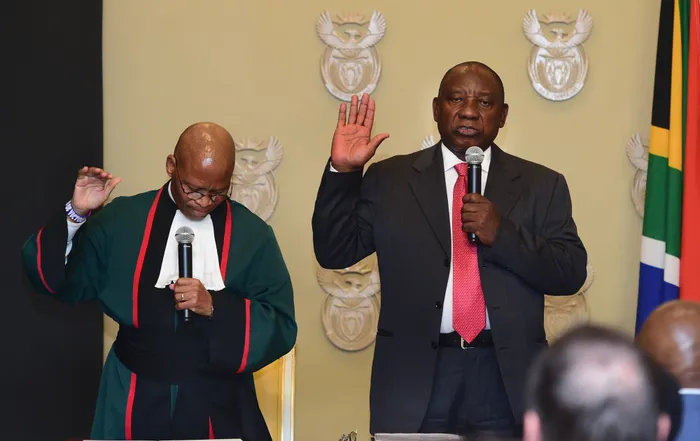Judiciary independence: former SA top judge's rumoured political ambition opens tough debate

By Zelna Jansen
It has been reported that the AllAfrican Alliance Movement selected retired Chief Justice Mogoeng Mogoeng as its presidential candidate. Many have questioned whether former Justice Mogoeng can stand for office in the 2024 national and provincial elections.
Particularly as retired judges receive their salaries for life. The intent behind judges being given lifelong salaries and being remunerated well is to insulate them from partisan politics and preserve the independence of the judiciary.
The rationale is that judges will be free to issue rulings based on law rather than seeking political favour. In terms of section 11(2) of the Judicial Services Commission Act of 1994, a “judge who has been discharged from active service may only with the written consent of the Minister (of Justice), acting after consultation with the Chief Justice, hold or perform any other office of profit or receive in respect of any fees, emoluments or other remuneration…”
The minister may only grant such consent if satisfied that it will not adversely affect the administration of justice, the image or reputation of the judiciary or undermine the legal framework. From the outset, it is highly unlikely that the minister will consent to Justice Mogoeng's standing to hold public office while being on the payroll of the judiciary.
A sound reason for the refusal is that the Constitution is based on the principle of separation of powers. The judiciary, legislature and executive have their constitutional mandates and must be independent of each other and not encroach on the other.
Justice Mogoeng is no longer issuing rulings but is on the payroll of the judiciary. Holding political office creates a link between the legislature and the judiciary. This link could be seen as indirectly hampering the independence of the judiciary. This will not sit well with any legal scholar. However, this is not the end of the discussion.
Justice Mogoeng can approach the Constitutional Court to have section 11 of the Judicial Services Act declared invalid. The Constitutional Court will look at the Judicial Services Act and how it constrains Justice Mogoeng’s political right to stand for public office as guaranteed by section 19(3)(b) of the Constitution.
The Constitutional Court has already interpreted what political rights entail. In the case of My Vote Counts NPC v Minister of Justice (2018), Justice Mogoeng himself noted that the right to stand for public office is tied up with the right to vote in elections, which means that every adult citizen may in terms of the Constitution stand as an independent candidate to be elected in municipalities, provincial legislatures, or the National Assembly.
The court stated that political rights include the right of independents to contest elections as they should not be forced to join political parties to contest the elections. These statements were discussed in the New Nation Movement v the President (2019).
The court ruled that the Electoral Act is unconstitutional to the extent that it makes it impossible for independent candidates to stand for political office without being members of political parties. It held that no one must be forced to associate.
The Electoral Act is in the process of being amended for independent candidates to contest the national and provincial elections. This may create the impression that Justice Mogoeng and the Constitutional Court have liberal views when it comes to interpreting political rights.
However, in interpreting the Constitution and weighing up rights and interests, the court must consider international law in line with section 39(1)(b) of the Constitution. International law is the set of rules, agreements and treaties that are binding between countries, and includes agreements and treaties that South Africa acceded to.
In the New Nation Movement judgment, article 10 of the African Charter on Human and Peoples’ Rights was instrumental. The article provides that everyone has the right to freedom of association; however, no one may be compelled to associate.
A ruling from the African Court stipulated that the “freedom of association is negated if an individual is forced to associate with others. Freedom of association is negated if other people are forced to join up with the individual. In other words, freedom of association implies freedom to associate and freedom not to associate.”
Although the above cases do not directly speak to the issue that Justice Mogoeng is facing, it does indicate how the Constitutional Court may interpret political rights. It is possible that Justice Mogoeng could succeed, as he cannot be forced to associate.
In this instance, he is forced to associate with the judiciary and if he does, he is prevented from holding office or contesting the elections. The court can interpret associating to include the right to be selected to hold office for a political party. Section 18 of the Constitution guarantees the right to associate.
The Constitutional Court must guard the separation between and independence of the judiciary, executive and legislature. It may allow Justice Mogoeng’s political right, subject to him terminating his ties to the judiciary.
That will include sacrificing his lifelong salary and any other benefits associated with it.
Jansen is a lawyer and CEO of Zelna Jansen Consultancy